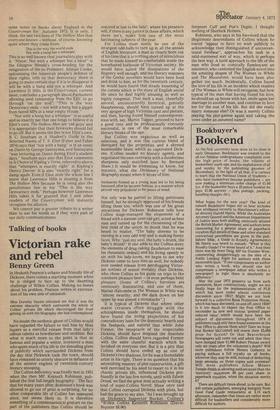Bookbuyer's
Bookend
As the first university term drew to its close in early December, Bookbuyer was treated to the all-too familiar undergraduate complaints over the high price of books, the villainy of booksellers' mark-ups, and the exploitation of all and sundry by the publishing gnomes of Bloomsbury. In the light of all that, it is curious to learn that the National Union of Students — who have themselves become publishers — are now making a minimum order charge of £1.00 (i.e. if the bookseller buys a 25 pence booklet he pays £1.00 anyway — plus postage, packing, handling charges, etc).
What hopes for the new year? The kind of remark Bookbuyer hopes not to hear includes that attributed recently to Hutchinson's editorial director Harold Harris. While the Australian Attorney General and the American Department of Justice were both sniffing ominously around the British Market Agreement, and authors were clamouring for a greater share of paperback royalties (full details of these and other standard contractual procedures are given in the publishers' bible, A Guide to Royalty Agreements) Mr Harris was heard to remark: "What is this Royalty Guide? I've never heard of it." And then there was Mr Peter Doig, MP for Dundee West, commenting disapprovingly on the idea of a Public Lending Right for authors with these memorable lines: "If one compensates an author who writes a book, why should one not compensate a newspaper editor who writes a newspaper? In logic there is absolutely no difference."
May the year 1975 preserve us from such utterances. More constructively, might we not finally hope for the implementation of PLR which has been under almost continuous discussion since 1951? Might we not look forward to a collective Book Promotion House, which has been discussed, on and off, since 1928? Is it too much to expect the Post Office to reconsider its new and vicious 'printed paper reduced rates' which would have been the subject of discussion throughout 1974 if publishers could only have found someone at the Post Office to discuss them with? Dare we hope that Booker McConnell will renew their £5,000 prize for fiction? Or that Beaverbrook Newspapers will come out and admit that they have dumped their £1,000 Robert Pitman award only six years after the columnist's death? Will more publishers follow Messrs Gollancz in paying authors a full royalty on all books, wherever they may be sold, instead of deducting large amounts on those copies sold overseas? Will more publishers follow Messrs Temple-Smith in allowing authors more than the 'statutory' maximum 60 per cent share in paperback royalties, when the situation merits it?
There are difficult times ahead, to be sure. But will certain publishers, emerging benignly from Good Food Guide restaurants at 3.15 each afternoon, remember that times are rather more difficult for booksellers and considerably more difficult for authors.


























 Previous page
Previous page